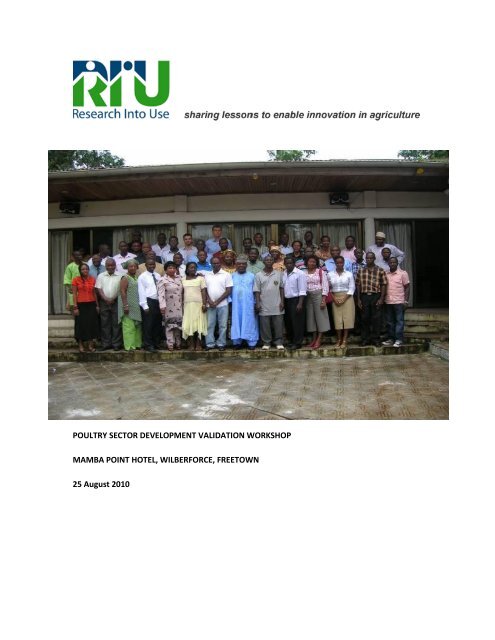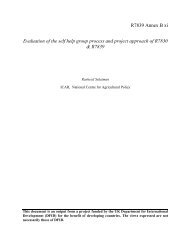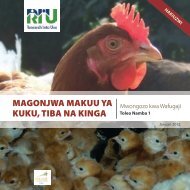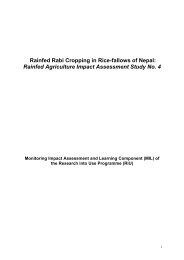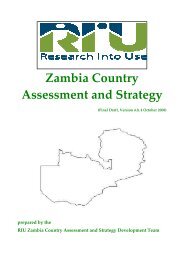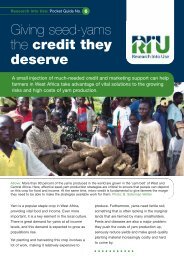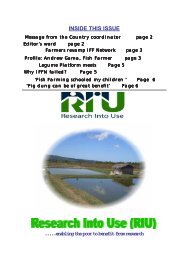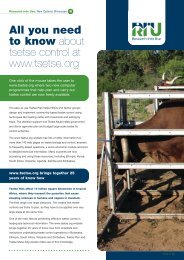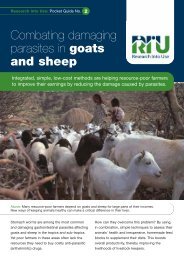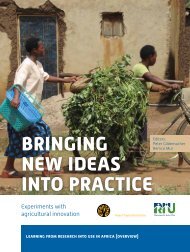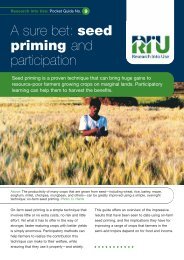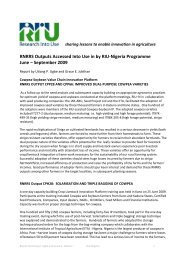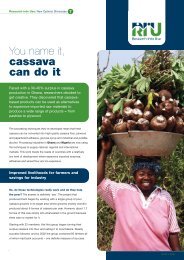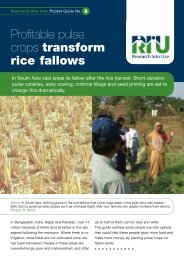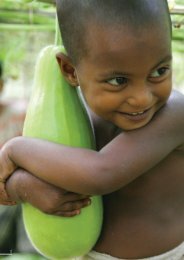poultry sector development validation workshop - Research Into Use
poultry sector development validation workshop - Research Into Use
poultry sector development validation workshop - Research Into Use
You also want an ePaper? Increase the reach of your titles
YUMPU automatically turns print PDFs into web optimized ePapers that Google loves.
POULTRY SECTOR DEVELOPMENT VALIDATION WORKSHOPMAMBA POINT HOTEL, WILBERFORCE, FREETOWN25 August 2010
POULTRY SECTOR DEVELOPMENT VALIDATION WORKSHOPTable of Contents1.0 INTRODUCTION .............................................................................................................................................. 32.0 OPENING COURTESIES ............................................................................................................................ 33.0 PRESENTATION ON FINDINGS - THE POULTRY SECTOR DEVELOPMENT STRATEGY AND INVESTMENTPLAN BY DR M JOHNNY ....................................................................................................................................... 43.1 OVERVIEW OF THE IMPORTANCE OF POULTRY IN THE NATIONAL ECONOMY ................................................................ 53.2 CONSTRAINTS OF THE POULTRY SUB SECTOR ....................................................................................................... 53.3 COPING STRATEGIES OF POULTRY FARMERS ......................................................................................................... 63.4 THE WAY FORWARD ........................................................................................................................................ 63.5 PLENARY DISCUSSIONS .................................................................................................................................... 74.0 PRESENTATION ON FEED SUPPORT SERVICES - FEED MASTERS LIMITED BY DR PHILIP M ESUGA ........... 84.1 SIERRA LEONE INVESTMENT OPPORTUNITIES ....................................................................................................... 84.1.1 Geography ............................................................................................................................................ 84.1.2 Economy ............................................................................................................................................... 84.2 BACKGROUND OF FEED MASTERS LIMITED COMPANY ........................................................................................... 94.3 THE LIVESTOCK INDUSTRY IN NIGERIA ............................................................................................................... 104.4 THE ADVANTAGE OF FEED MASTERS LIMITED .................................................................................................... 104.5 PROPOSAL FROM THE FEED MASTERS LIMITED ................................................................................................... 114.6 FEED MASTERS PRODUCTS AND SERVICES ......................................................................................................... 124.7 PLENARY DISCUSSIONS .................................................................................................................................. 125.0 GROUP WORK AND PRESENTATIONS ................................................................................................... 135.1 PRESENTATION BY GROUP 1-4 ....................................................................................................................... 146.0 ACTION POINTS .................................................................................................................................... 157.0 PLAN OF ACTION FOR STAKEHOLDERS AND SLRIU FOR THE NEXT 6 MONTHS ...................................... 16ANNEX 1: ATTENDANCE LIST ............................................................................................................................. 1725 August 2010 RIU Team meeting Page 2 of 19
POULTRY SECTOR DEVELOPMENT VALIDATION WORKSHOP1.0 IntroductionThe Sierra Leone <strong>Research</strong> <strong>Into</strong> <strong>Use</strong> in collaboration with the Partnership in Agricultural Innovation forDevelopment in Sierra Leone (PAID-SL) organized a day <strong>validation</strong> <strong>workshop</strong> on 25 August 2010 forstakeholders in the <strong>poultry</strong> <strong>sector</strong>. The <strong>workshop</strong> attracted various participants from governmentMDAs, NGOs, producer organizations, SLARI, FAO etc.The <strong>workshop</strong> mainly focused on validating the report produced by these independent consultants andidentifies opportunities for investment so that this sub-<strong>sector</strong> will make meaningful contribution to theGross Domestic Product (GDP) of Sierra Leone. The <strong>validation</strong> was done by bringing out action points,tasks and key actors that will be targeted in order to achieve the objective and also looked at the roleexpected of Sierra Leone RIU for effective facilitation in the process in an atmosphere of learning andexperience sharing. Apparently, presentations, questions, answers and comments were made at theplenary. Participants were also randomly organized into four groups for discussions on specificquestions and findings from these groups were presented and discussed. Thus, this report focused onthe presentations and discussions done on the plenary.2.0 Opening CourtesiesThe <strong>workshop</strong> started at 09:30am with individual prayers led by Mr David Sam Suale (SL RIU CountryCoordinator). The chairman, Mr Buckle (Acting Deputy Director of Livestock) was introduced afterwhich all participants were asked to introduce themselves. The chairman of the gathering expressed hisappreciation for spearheading such an all important initiative by the Sierra Leone <strong>Research</strong> into use.“The composition of participants (stakeholders) was a clear indicator to explain the significant nature ofthe <strong>workshop</strong>” he concluded.In his welcome statement, SL RIU Country Coordinator – Mr David Sam Suale expressed his satisfactionwith the attendance (the present of <strong>poultry</strong> production stakeholders and his colleagues from Italy andNigeria) and used the opportunity to give the background of the <strong>workshop</strong>. The RIU programme he saidis a DFID –UK funded programme aimed at catalyzing agricultural innovation as follow-up to DFID’s£220m investment in the renewable natural Resources <strong>Research</strong> Strategy (RNRRS). This he saidrepresent a shift in emphasis away from generating new knowledge and towards ensuring that existingresearch with potent is promoted and scaled up successfully to achieve lasting <strong>development</strong> impact. Hewent further to explain that the SLRIU strategy focuses on developing relationships and linkages25 August 2010 RIU Team meeting Page 3 of 19
POULTRY SECTOR DEVELOPMENT VALIDATION WORKSHOPbetween organizations which will lead to knowledge flow and utilization. It focuses mainly onintermediary function. This strategy he said is implemented through the partnership approach, viaexisting linkages and those who are mediating i.e. government agency (MDAS), CBO’s including farmerorganizations, NGO’s.In his statement, the Head of RIU Africa Programmes (Dr Jeroen Dijkman) summarized by explainingthat <strong>Research</strong> <strong>Into</strong> <strong>Use</strong> (RIU) programmes funded by DFID operates in not only Sierra Leone, but anumber of other African countries including: Nigeria, Rwanda, Tanzania, Malawi and Zambia and focuson sharing lessons learnt from getting research into use with key actors for the <strong>development</strong> ofagriculture; the reason for which this <strong>workshop</strong> was organized. He noted that most of the <strong>poultry</strong>products ( e.g. eggs and meat ) we eat in Sierra Leone are imported from foreign countries such asHolland, Brazil to name a few, when the country has the potential to not only produce but also processand export surplus for foreign exchange. If these potentials are exploited and utilized very well, <strong>poultry</strong>production will contribute not only to food security, but provide employment opportunities andimproves the livelihood of Sierra Leoneans. Conclusively, he said, the expectation of this gathering wasto validate the <strong>poultry</strong> <strong>sector</strong> baseline assessment document so that stuffs would be put together tohelp develop <strong>poultry</strong> in Sierra Leone.3.0 Presentation on Findings - The Poultry Sector Development Strategy and InvestmentPlan by Dr M JohnnyA summary document on the baseline assessment of the <strong>poultry</strong> <strong>sector</strong> <strong>development</strong> in Sierra Leonewas presented to the plenary for <strong>validation</strong>. The document took into consideration the followingpoints:Overview of the importance of <strong>poultry</strong> in the national economy.Constraints of the <strong>poultry</strong> <strong>sector</strong>.Coping strategies of <strong>poultry</strong> farmers.The way forward.25 August 2010 RIU Team meeting Page 4 of 19
POULTRY SECTOR DEVELOPMENT VALIDATION WORKSHOP3.1 Overview of the importance of <strong>poultry</strong> in the national economyIt was established that Poultry production accounts for the major part of all meat produced in manydeveloping countries with Sierra Leone no exception and is an integral part of nearly all rural, periurbanand urban households’ production. Poultry are of considerable significance to rural as well asnational economies and are an important source of animal protein. Poultry products (eggs and meat)constitute approximately 30% of all animal protein consumed worldwide. This is predicted to increaseto 40% by the year 2015.3.2 Constraints of the Poultry Sub SectorIt was established that the demand for <strong>poultry</strong> products has increased substantially in recent yearsowing to the rapid increase in the urban population, which has a high concentration of foreignnationals and other relatively affluent residents that can afford these products. Present demand farexceeds local production – a fact which has resulted in ever-increasing volumes of importation tosatisfy the shortfall. Prices of <strong>poultry</strong> products are high due to high demand.According to the report the following constraints were highlighted:There are few <strong>poultry</strong> enterprises in Sierra Leone mostly in urban locations especially WesternArea and BoShortage of feed mill.The assessment revealed unavailability of hatcheryVeterinary services are very rudimentary in Sierra LeoneThere is paucity of trained personnel andThe general unavailability of essential drugs for livestockSources of funding and/or credit for the livestock <strong>sector</strong> generally are few and far between.Traditional reticence of financial institutions to lend to the agricultural <strong>sector</strong>, in general, andthe <strong>poultry</strong> sub-<strong>sector</strong>, in particular, because of its perceived riskiness.Erratic electricity supplyTaxation of <strong>poultry</strong> farming inputsLow Government premium on livestock production25 August 2010 RIU Team meeting Page 5 of 19
POULTRY SECTOR DEVELOPMENT VALIDATION WORKSHOPUnregulated importation of eggs and <strong>poultry</strong> products leading to unfair competition with thelocal industryLabour shortageLow technical capacity of most Sierra Leoneans in <strong>poultry</strong> production:3.3 Coping strategies of <strong>poultry</strong> farmersMost of the constraints of the <strong>poultry</strong> <strong>sector</strong> are outside the purview of individual operators (e.g.taxation, unregulated importation of <strong>poultry</strong> products, etc). For such constraints, participants can onlymake recommendations for the attention of Government. It was therefore recommended that thisforum develops possible copping strategies for <strong>poultry</strong> production improvement.3.4 The way forwardRecommendations of <strong>poultry</strong> farmers for promoting the <strong>sector</strong> included:Relaxation of Government taxes associated with the importation of <strong>poultry</strong> inputs.The rehabilitation of existing but non-functional hatcheries and the establishment of new onesby Government and its <strong>development</strong> partners.Veterinary services should be strengthened to provide essential advice to <strong>poultry</strong> producersnationwideThe electric power problem should be addressed to ensure continuous power supply both inurban and rural areas.The establishment of cottage industries through the help of <strong>development</strong> partners for theproduction of feeds, concentrates and vaccines for <strong>poultry</strong>.Government should encourage commercial banks and other financial intermediaries to allocatea specified proportion of their loan portfolio to <strong>poultry</strong> farming in the form of loans.25 August 2010 RIU Team meeting Page 6 of 19
POULTRY SECTOR DEVELOPMENT VALIDATION WORKSHOP3.5 Plenary DiscussionsThe plenary appreciated and thanks the presenter and team for such an excellent work. It wasconfirmed by stakeholders that the document reflect happenings on the ground. Hence, most of theissues especially the problems were reiterated by participants. The most common problems mentionedin the discussion included; youth laziness, the expensive nature of <strong>poultry</strong> farming, lack of hatcheriesand its costly nature to operates, lack of continuous electricity, the feeds especially concentrates takes60 to 70% of the production cost, low government commitment.According to the National Revenue Authority, 5% tariff and 20% customs are levied for both day-oldchicks and concentrates, making a total charge in excess of 25%.stock <strong>sector</strong> generally are few and farbetween. Currently, a policy has been develop for a complete waiver of tax on all <strong>poultry</strong> feeds andequipment but the protocols are so much that if farmers are to follow these most of our productswhich are perishable will be destroyed. Therefore, pig/<strong>poultry</strong> association was tasked to do somethingwith regards a complete waiver with no protocol.Njala university offers an opportunity to train agriculture personnel mostly youth so as to engage themrather than being idle. Theft of livestock and other farming products are done by youths, so if they areprofitably engaged the issue of theft will be a thing of the past. It was again suggested that Njala needto introduce short term courses for training of <strong>poultry</strong> farmers so as to keep them abreast with currentissues in the field of agriculture.It was stated that in Sierra Leone, fish is mostly use in <strong>poultry</strong> feed instead of Soya beans because of itcost effectiveness.Some participants expected to see something on <strong>poultry</strong> production value chain which explains how<strong>poultry</strong> production takes place from <strong>poultry</strong>/hatchery to the final consumer. This will give us an insightinto what should be done by whom for our intervention.Identification of available local materials for <strong>poultry</strong> feeds preparation in Sierra Leone. But Dr Jallohurged the plenary to read a book title “Tropical feed” if anyone wants to know more about <strong>poultry</strong>feed.In conclusion, participants were eager to know what next will happen having put together perfectstuffs to improve <strong>poultry</strong> <strong>sector</strong>. There were concerns as to suggest the way forward with regards the25 August 2010 RIU Team meeting Page 7 of 19
POULTRY SECTOR DEVELOPMENT VALIDATION WORKSHOProle of RIU, Farmer federation, and private <strong>sector</strong> investors. Concerns were raised as who was willing todo what about what has been found out. It was noted by the chairman that the answer will surelycome during the group discussions.4.0 Presentation on Feed Support Services - FEED MASTERS LIMITED by Dr Philip M EsugaIn his presentation, Dr Philip M Esuga elaborated on the following:1) Sierra Leone’s Investment Opportunities2) Background of Feed Masters Limited3) The livestock industry in Nigeria4) The advantage of Feed Masters Ltd5) Feed Masters Proposal6) Feed masters products and services4.1 Sierra Leone Investment Opportunities4.1.1 GeographySierra Leone is located on the West Coast of Africa with a total area of 71,740 sq. km. (29,925 sq. mi.)which is slightly smaller than South Carolina with cities: Capital--Freetown (est. 786,900). Provincialcapitals - Southern Province, Bo; Eastern Province, Kenema; Northern Province, Makeni. The vegetationincludes terrains, Mangrove swamps, tropical rain forest and beaches with mostly shallow bays alongthe coast, wooded hills along the immediate interior, and a mountainous plateau in the interior. Thetotal population as at July 2009 (est., CIA World Fact book) was 5,132,138 and the annual populationgrowth rate at that time was 2.179%.4.1.2 EconomyThe country is endowed with several natural resources including : Diamonds, titanium ore (rutile),bauxite, gold, iron ore, ilmenorutile, platinum, chromite, manganese, cassiterite, molybdenite, as wellas forests, abundant fresh water, and rich offshore fishing grounds. Agriculture: Products--coffee,cocoa, ginger, palm kernels, palm oil, cassava, bananas, citrus, peanuts, cashews, plantains, rice, sweet25 August 2010 RIU Team meeting Page 8 of 19
POULTRY SECTOR DEVELOPMENT VALIDATION WORKSHOPpotatoes, vegetables, cattle, pigs, <strong>poultry</strong>, sheep, fish. Land--30% potentially arable, 9% cultivated.About two-thirds of the population engages in subsistence agriculture, which accounts for 49% ofnational income.From records he elaborated that Sierra Leone’s Major destinations of exports includes; Belgium 39.2%,U.S. 22.1%, India 7%, France 5.4%, Netherlands 4.1%. Imports--$372.4 million f.o.b. (2009 est., EIU):foodstuffs, machinery and equipment, fuel and lubricants, chemicals, pharmaceuticals, buildingmaterials, light consumer goods, used clothing, textiles. The main origins of imports countries are;China 10.2%, U.S. 7.8%, Belgium 6.6%, U.K. 6.5%, Cote d’Ivoire 6.2%, India 5.6%, Thailand 5.1%. (2008,CIA World Fact book). Feed Masters Limited is properly positioned and staffed to add to this list so asto eliminate these constraints in Sierra Leone, he concluded.4.2 Background of Feed Masters Limited CompanyGiving the background of the company Dr P M Esuga explained that Feed Masters Ltd, an indigenouscompany was established in the year 2000 with a vision to be the foremost livestock feed producingcompany which today has a force and a key player in the industry. It is one of the animal feed <strong>sector</strong>produces and Exports <strong>poultry</strong> products. This company is today in a position to produce and supply over210mt of high quality animal feeds and concentrates per day with a 10 tons per hour productioncapacity using ultra modern feed mill plant in Ilorin. Their production facility is rated among the top tenin Nigeria.This company has provided a choice of presentation in Mash or Pellet forms for all classes of livestock.Amidst the numerous challenges including the dominance of multinationals in the <strong>sector</strong>, they havebeen able to overcome by dint of hard-work, diligence and continuous product improvement tointernational standards.Furthermore he stated that Feed Master Ltd has core values that hinges around professionalism,integrity, continuous product <strong>development</strong>, exceeding customer expectations and diversification withathat is professionally committed to livestock production, nutrition, health and management inpartnership with farmers.25 August 2010 RIU Team meeting Page 9 of 19
POULTRY SECTOR DEVELOPMENT VALIDATION WORKSHOPAgainst this backdrop, Feed Masters Ltd is officially recognized by the Federal Government, PoultryAssociation of Nigeria (PAN), Fishery Society of Nigeria (FISON), Standards Organization of Nigeria(SON), as one of the major stake holders in the Nigerian Livestock feed industry.4.3 The livestock industry in NigeriaAccording to Popular Foods limited, a subsidiary of Stallion group ltd, total food imports in 2008 standsat $27.97billion. Fish and <strong>poultry</strong> imports stands at $2.5billion while Powder milk was $2.0billion. Theagricultural industry contributes 39% of Nigeria Gross Domestic Product (GDP). The livestock sub-<strong>sector</strong>provides opportunity to add value to primary agricultural products by converting it to scarce protein inthe form of egg, milk or meat. The livestock sub-<strong>sector</strong> is fast becoming a high-tech enterprise inNigeria and indigenous production systems are becoming less profitable.In addition, he stated that several livestock production systems (both privately and governmentowned) has failed in Nigeria due to several factors–some beyond the control of the owners.Feed Masters Ltd has a wealth of experiences that span several decades and have been used timewithout number to establish, manage, revive and bring even loss making ventures profitable andprofitable ones more profitable.Talking about the challenges in livestock production, He started by agreeing with earlier presenter, DrMichael Johnny, that the major constraint in livestock production is nutrition which in Nigeriaconstitutes 70% of the cost of production.Another constraint mentioned was lack of technical support services and linkages with investors on onehand to bring to their knowledge the expertise available in feed production to achieve maximumprofitability.4.4 The advantage of Feed Masters LimitedWith regards the advantages of their industry he said that Feed Masters Ltd has blazed a trail inpioneering the introduction of the first sanitized <strong>poultry</strong> mash as commercially available feed in thelivestock industry in Nigeria, in conjunction with other practices that have become standards in themarket place. This ensures that birds mature with forty-two for sales.This include among others:25 August 2010 RIU Team meeting Page 10 of 19
POULTRY SECTOR DEVELOPMENT VALIDATION WORKSHOP<strong>Use</strong> of sanitizers in commercial feeds.<strong>Use</strong> of digestive enzymes.<strong>Use</strong> of toxin binders.Inclusion of coccidiostat4.5 Proposal from the Feed Masters limitedIn his proposal he requested a technical partnership with <strong>poultry</strong> farmers as they have done with someof the most successful livestock production enterprises in the past ten years. He promised to bringtheir expertise in animal nutrition, feed milling, integration of livestock production systems andmarketing to farmers’ advantage and profitability.For our enterprise, he proposes a customization of all animal feeds and concentrates taking intoconsideration the available local raw materials on a least cost formulation basis.Areas of concern in the livestock production systems today are mainly the feed and drugs. To overcomethe adulteration and faking of raw materials and micro ingredients meant for feed formulationchallenge, they customize concentrates for specific farms offers the following advantages:Easy convenience of mixing with only maize and wheat offal to prepare finished feed atreduced costAssured qualityAffordabilityEffective time utilization and ManagementProtection against raw materials adulterationElimination of wasteReduced logistics costSupported by Technical Field RepresentativeFor this reason they have an endless list of clients with stock population in excess of 50,000 - 200,00025 August 2010 RIU Team meeting Page 11 of 19
POULTRY SECTOR DEVELOPMENT VALIDATION WORKSHOP4.6 Feed Masters Products and ServicesManufacturing of animal feeds and concentrates for all categories of animals on land and inwaterExtraction of edible oil.Farming E.g. EXCEL FARMS actively involved in direct production and supplies of <strong>poultry</strong>products (eggs and broiler meat). and in the production and distribution of healthy point of laypullets.Animal health and nutritional productsInvolved in the sales, marketing and distribution of healthy day old chicks (Doc) from primaryhatcheriesInvolved in the sales, distribution and installation of Livestock equipment, such as milkingmachines, incubators, hatchers, <strong>poultry</strong> cages, other Livestock equipment, vaccines, biologicaland Sera.The company operates a consultancy service outfit in the name of MASTERS CONSULTS LTD forwould be livestock <strong>sector</strong>, fish farmers e.t.c.4.7 Plenary DiscussionsAfter his presentation, the plenary wanted clarifications including;Whether his company (Feed Master LTD), had an intention of investing in Sierra LeoneWhether this country will be able to overcome constrains identified. Such as availability of Soyabeans, enzymes, addictives not produced hereWhether animal proteins should not be used in <strong>poultry</strong> feed at all.Whether GM feed is use in his feed composition/productionWhat will be the weight of forty-two day’s old (42 days) broiler ready forprocessing/marketing?People were also interested in knowing the modules operadi of investment between thecompany and the customer.In his response, Dr Philip Esuga said that the main purpose of being here was to create link withidentified area of interest more especially <strong>poultry</strong> farmers and/or association (s) so as to allowhis company (Feed Master LTD) go into business in the list of services offered.25 August 2010 RIU Team meeting Page 12 of 19
POULTRY SECTOR DEVELOPMENT VALIDATION WORKSHOPHe also stated the need for expertise to utilize expensive and costly addictives used inpreparation of animal feed though most of these addictives need to be imported.In response to the use of animal protein in preparing <strong>poultry</strong> feed, he refuted saying thatanimal proteins cannot be use but that small amount were possible just for the smell should beuse. He sighted an example of fish meal that constitutes no fish. It is like a placebo. That is thecurrent trend of direction the world is going hence the need for us to follow.He also denied using genetically modified material in their food stuff.He emphasis that if fowls are only given their feed, within forty-two days they will be maturedfor sale with a weight of 1.5kg.For marketing arrangement, he propose a customization of all animal feeds and concentratestaking into consideration the available local raw materials on a least cost formulation basis.Afinish credits will also be giving for repayment within two weeks at the same selling price.5.0 Group work and presentationsParticipants were puts into four groups for discussion of the following questions:What are the key opportunities for investment in the <strong>poultry</strong> sub- <strong>sector</strong>?What should we do to maximize these opportunities?Who should do what? (I.e. Key actors)What should be the role of SLRIU in the process?After 30 - 45 minutes of discussions at group level, the following presentations were made:25 August 2010 RIU Team meeting Page 13 of 19
POULTRY SECTOR DEVELOPMENT VALIDATION WORKSHOP5.1 Presentation by Group 1-4What are the keyopportunities for investmentin the <strong>poultry</strong> sub- <strong>sector</strong>?What should we do tomaximize theseopportunities?What should be the role ofSLRIU in the process?What should be the role ofSLRIU in the process?• In Sierra Leone theopportunities exist toestablish a feed mills andhatcheries• Provision of veterinaryservices, drugs, and <strong>poultry</strong>production equipments• There are funding sourcesfrom donors•There are available localmarkets for the finishedproducts• Local farmers should beencouraged to produce rawmaterials for feed productionand partner with local andinternational investors• Encourage the<strong>development</strong> orestablishments of private<strong>sector</strong>s in the business of<strong>poultry</strong> farming• Train them for technicalskills• Encourage farmercooperatives to have accessto loans from bankinginstitutions• Farmers should take up theventure to start <strong>poultry</strong>farming• Government to providesubsidies, design policies tofavour <strong>poultry</strong> management.For instance, waiver of taxeson all <strong>poultry</strong> inputs andequipments.• Non-governmentalOrganizations to providefunds for investments in this<strong>sector</strong>.• Facilitate the training offarmers in technical skills• Help identify donors• Network with otherfarmers and <strong>sector</strong>s in othercountries for seriousinvestmentsThe key opportunities forinvestment in the <strong>poultry</strong>sub-<strong>sector</strong> include;• Availability of the humanresources i.e. cheap labour• Availability of the rawmaterials for feedproduction,• Availability of the localmarket• Availability of the land.• Encourage the feasibility ofgovernment to develop our<strong>poultry</strong> industry with policiesto decrease imports andimprove the national market.• Improve and increaseaccess to finance• Improve capacity buildingand practical research• Improve on regulatory andlegal systems e.g. import andexport tax laws• Improve infrastructure foraccess to market• Establish structures tomaximize production(producer organizations,marketing organizations etc.)• Key actors and theirresponsibilities include;• Producer organizations- toproduce feeds, raise/care forthe birds• Marketing organizations-tomarket eggs and meats/products• Processing organizations-Slaughter, packagingprocesses etc• Government –developfavourable policies andprocedures• Private <strong>sector</strong> coordinatingunits-coordinate all private<strong>sector</strong>s involve in <strong>poultry</strong>production• Donors/Developmentpartners-provide support(e.g. founds, capacitybuilding etc)•Financial institutionsprovideloan/credits for<strong>poultry</strong> producers• To train and disseminateresearch packages• Conduct feasibility studies• Disseminate usefulresearch information.25 August 2010 RIU Team meeting Page 14 of 19
POULTRY SECTOR DEVELOPMENT VALIDATION WORKSHOPThere are a lot ofinvestment opportunities inthe following;• Incubation and hatchingof eggs• Meat & eggs production• Feed production• Veterinary/drugs services,and• Marketing opportunitiesexist in Sierra Leone• Processing/value addition• Production of some localinputs/feeds e.g. maize•There is need for theestablishment of partnershipwith all institutions involvedin <strong>poultry</strong> productionactivities• Establish favourablegovernmentpolicies/legislations• Creation of a level playingfield for all by government•Government line ministriesshould take the leads. e.g.Finance ministry shouldestablish laws that allowfinancial institutions toprovide founds• Farmers associationsshould as advocacy groups• <strong>Research</strong> institutionsshould also continueproviding fora forinformation shearing inimprove technology• Agricultural chamber ofcommerce to promote tradeand marketing facilities• Crop farmers should helpto plant local input materialsfor feed production.• RIU should create linkages,• Help build the capacity of<strong>poultry</strong> farmers• It should also aid farmerssolicit funds for <strong>poultry</strong>farmers and theirassociations• There are huge marketpotentials for <strong>poultry</strong>products such as eggs,<strong>poultry</strong>, meat, and a day oldchicks• There is an available andaffordable labour and landresources• Tax waivers on agriculturalinputs and equipments bycentral government• Availability of local feedresources.• Application of bio securitymeasures• Creation of an enablingenvironment for indigenousindustries to operate andfairly compete withestablished internationalorganizations/industries• Provide technical assistanceand capacity <strong>development</strong>e.g. training in animalproduction, marketing etc.• Creation of adequate publicawareness• Embark on value additionof <strong>poultry</strong> products• Adopt a sound marketingpolicy• Poultry producers shouldproduce feed• Veterinary services shouldbe provided by thegovernment• Funds should be madeavailable by financialinstitutions• Poultry producers shouldorganize themselves into<strong>poultry</strong>/pig association at anational level• Taxes should be waived onall agricultural inputs andequipment by government• Continuous researchshould be done by researchinstitutions e.g. SLARI anduniversities• Continue to providecoordination of stakeholdersin <strong>poultry</strong> production andmake recommendations tothe central government• Organize training<strong>workshop</strong>s• Mobilize resources forfarmers• Identify potentialopportunities such asmarkets, funding sources,technical expertise etc.6.0 Action PointsThe following were action plan agreed by the RIU and the Stakeholders.Training in the <strong>development</strong> of a business PlanDevelop a business planIdentify a unit to coordinate <strong>poultry</strong> Sector <strong>development</strong>Strengthen the current role of the coordination role being played by MAFFS.25 August 2010 RIU Team meeting Page 15 of 19
POULTRY SECTOR DEVELOPMENT VALIDATION WORKSHOPIdentify local producers who are currently producing feeds, pharmaceuticals and otherservices and encourage synergy between them.To establish resource centres across the country to aid <strong>poultry</strong> farmers andentrepreneurs7.0 Plan of action for stakeholders and SLRIU for the next 6 months Organise training sessions (nation-wide) on <strong>poultry</strong> production and marketing. (Within 6months). To be done by Pig/Poultry Association Executive.Poultry producers should organize themselves into a formidable group/federation for betterperformance (in progress)Urgent actions should be taken to alleviate the problem of taxation (within 2 months from thisdate). To be done by Pig/Poultry Association Executive.MAFFS and Njala University to collaborate with the executives of <strong>poultry</strong> Associations toidentify appropriate private <strong>sector</strong> partners to aid with feed production. (2 weeks)Hatchery: Reactivate existing facilities (Pig/Poultry Association Executive in collaboration withRIU).RIU to create linkages and facilitate all actions points.25 August 2010 RIU Team meeting Page 16 of 19
POULTRY SECTOR DEVELOPMENT VALIDATION WORKSHOPAnnex 1: Attendance ListNo Name Organization Designation E-mail Address Phone No1 Joseph P Buckle MAFFS Senior Livestock Officer 076687102 Alhassan B Koroma NAFSL Farmer 0766123783 Monica Chea PPFA Mambo Farmer 0766687714 David S Suale SLRIU Country Coordinator davidsuale@yahoo.co.uk 0766221525 Mohamed H Deen MAFFS Animal Production Officer soriesl@yahoo.com 0769875146 Edwin Momoh Njala University Senior Lecturer kattiemoore@yahoo.com 0786599827 Holima A Samai SLRIU Programme Asst. holimasamai@yaoo.co.uk 0766445848 A C Wurie Farmer acwuriea@hotmail.com 0766101319 Hawa Floode Dorays Poultry Farmer doray<strong>poultry</strong>@yahoo.com 07662254510 Saidu Kanu Njala University Head animal science saidukamara@yahoo.com 03334987611 Aiah D. Jombu Awoko N/paper Reporter Aiahjonbu72@yahoo.com 07684394712 Joseph Katta SCHDO Farm Manager 07676839413 Dick S Johnson Paloko <strong>poultry</strong> Proprietor diksiljay@yahoo.co.uk 033755650/07666112314 H R Mansaray Yele Poultry Manager amaramomoh@yahoo.com 07670834515 Nyakeh B Mansaray Development Alliance Admin/Fin officer <strong>poultry</strong>chicken@yahoo.com 03354807016 Alusine Sesay Primer News Reporter alusineprimer@yahoo.com 07684865525 August 2010 RIU Team meeting Page 17 of 19
POULTRY SECTOR DEVELOPMENT VALIDATION WORKSHOP17 Dr A Jalloh MAFFS Director livestock steriliseit@yahoo.com 033/076 60184518 Maligie S Conteh M S & D Poultry Deputy Manager 07667487419 Victor Prada FAO Victor.PRADA@yahoo.org 0788058520 Judith Sannah SLBS/TV Reporter sannahjudith@yahoo.com 03336310221 B A Kanu MAFFS Youth coordinator brimaahmed@yahoo.com 07687490922 John Juana MCSL Project Officer jojuana79@yahoo.com 03345457923 Mariam S Barrie FAO Intern mayama66044@yahoo.com 03366983124 Mustapha Jaby Farmer 07796483125 Utiang Ugbe RIU-Nigeria <strong>Research</strong> Fellow utiang@gmail.com26 Habib Pajah Pajah & I.J Farmer habibpajah@hotmail.com 03334151827 Jeroen Dijkman RIU Head RIU Africa Programme jeroen.dijkman@fao.org 349237590628 Victor A Sawyer DAFO Project Manager vickyzy2005@yahoo.com 03389591029 Dr Samuel Carew SLARI Desk Officer-Teko samuel.carew@yahoo.co.uk 07696963030 Agnes Alpha Development Alliance Coordinator 07652293031 Vctor Momoh CHIDO CHIDO Programme Officer chiddo300@yahoo.com 07684858132 Abie J Suale CHIDO National Coordinator Chiddo300@yahoo.com 07684858133 Francis Juana JAMKA Proprietor Fjuana32@yahoo.com 07731384434 Abubakarr Alpha Jabex <strong>poultry</strong> Coordinator abualpha@yahoo.com 03377357335 Mohamend Konneh Standard Times Reporter Mk353576@gmail.com 03335357625 August 2010 RIU Team meeting Page 18 of 19
POULTRY SECTOR DEVELOPMENT VALIDATION WORKSHOP36 Thomas Neales SLBS/TV Cameraman Tnede70@yahoo.com 03333385137 Sydney P S John NAFFSL Zeumu Garden Naffsl2009@yahoo.com 07749652538 Oya J Kargbo Mabceh Women Org Mawusie145@yahoo.com 07671739639 Ya Almany Turay Cole Town Farmer 07672263140 E S Kargbo YMAE Chief Executive eskargbo@yahoo.com 07662633841 Fredick Hanciles NFFSL Farmer fredwinhanciles@yahoo.com 07667267342 Sumalia Bangura NaFFSL Deputy Sec Gen 07794695543 Chris Squire Fourah Bay College Dean of Engineering Squirechris15@yahoo.com 07661061044 Mohamed Kallon New Vision Reporter mohaamedkallon@yahoo.com 03318155745 Dr Bob Conteh Njala University Consultant 03345079346 Mohamend Massaquoi Concord Times Reporter massaquoikenema@yahoo.com 03350898447 Ahamed Nanoh SLCAD Executive Secretary aknanoh@yahoo.co.uk 07664256348 Mariam Sesay CTN Reporter Mansmarie2005@yahoo.com 03371724149 Tommy Harding NARECO Public Relations Officer breemsbliss@yahoo.com 07653838350 Idrissa Sannoh SLRIU Data Base Manager Idsan-adj@yahoo.com 07720869851 M S K Fofanah ZAIMOH 07668999152 Prince Bernard Farmer 07660801353 Idris Godwin OAKS ENT Manager irisgodwin@yahoo.com 07662010225 August 2010 RIU Team meeting Page 19 of 19


